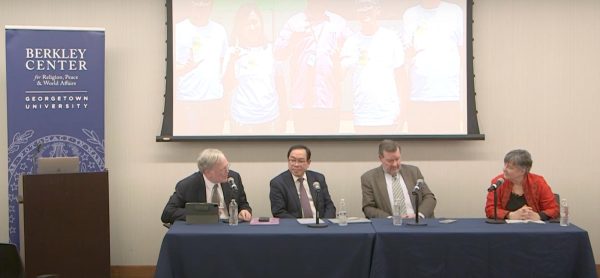Georgetown University hosted a panel titled “Tolerance and Respect: Educational Paths in Indonesia,” focusing on Indonesia’s implementation of cross-cultural religious literacy in regional schools Jan. 29.
The event was co-sponsored by the Georgetown University Berkley Center for Religion, Peace, and World Affairs and the G20 Interfaith Forum Association, which brings religious institutions together to discuss global issues. The panel delved into the intricacies of fostering mutual understanding in a diverse society like Indonesia to analyze how education can bridge deep religious and cultural divides. Featured speakers included Matius Ho from the Leimena Institute, which discusses citizenship and politics in a religious context, Chris Seiple from the Templeton Religion Trust, a charity that sponsors discussions of religion, and Katherine Marshall, a senior fellow at the Berkley Center.
According to Ho, Indonesia’s approach to education aims to integrate culture and religion in creating a unitary state despite boasting over 270 million people, more than 1,300 ethnicities and over 800 spoken languages.
Seiple said culture is an important aspect of communication and establishing a sense of literacy and understanding.
“We call it cross-cultural religious literacy because culture is important. People get spirit and religion, especially when there’s secular fundamentalism,” Seiple said at the event.
“Cross-cultural religious literacy embodies freedom, conscious freedom of religion or belief and character development. It is competencies and skills, including a personal competency, a comparative competency and a collaborative competency,” Seiple added.
Ho highlighted the success of the Cross-Cultural Religious Literacy program aimed at primary and secondary school teachers across Indonesia. In a presentation, Ho shared statistics and stories, including an initiative where Christian school students visited a madrasa, a Muslim school, exemplifying the practical impact of these educational efforts.
Ho said preparing teachers to integrate religious discussions and giving them tools helps promote new programs such as the visit to the Madrasa.
“We develop these teacher training programs. So there are guidelines on intercultural education where our vision in education aims to accurately shape the liaisons between people,” Ho said.
Ho added that the program aims to broaden its reach within the region and to surrounding countries.
“We are developing a database so that we can be a reference for other teachers on how they can use these principles,” Ho said.

Seiple said he finds it helpful to highlight the disconnect between the religious world and public policy. He stressed the vital role of religious literacy in diplomacy, especially in platforms like the G20, where he said religion often remains an overlooked dimension.
“The framework gives an opportunity for people to express their faith identity in its entirety without offending somebody,” Seiple said. “Part of the reason it works is because of the non-religious terminology and engagement, building social cohesion and preventing extremism.”
Marshall added to the conversation on global development, noting that there was a lack of religious considerations in diplomacy and international discussions, despite the majority of the world holding religious beliefs.
“84% of the world’s population has a religious affiliation, and yet very large parts of discussions about diplomacy and public policy simply do not mention religion,” Marshall said at the event.
The panelists unanimously agreed on the urgent need for religious literacy, not just as knowledge but as a tool for conflict resolution and peacebuilding.
“Cross-cultural religious literacy borrows from the field of conflict resolution, once you enter into a part of it,” Seiple said. “I took away from both of those experiences the desire to engage with respect and then execute with excellence.”
The event concluded with panelists addressing the challenges of extending these efforts to minorities and other faiths, and Seiple said it is important to take a holistic approach to religious education.
“It’s important to develop trust and social capital by working together with people of other faiths,” Seiple said.








